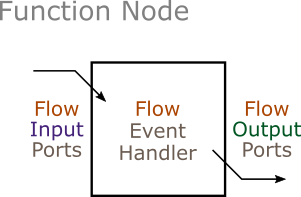| Prev | User Manual – Table of Contents | Next |
Function Nodes
The function node represents a single function that reads a set of input values and calculates a set of output values. It is placed in the dataflow network associated with the initialization or finalization phase of a composite node. In general, the purpose of a function node is to perform some or all of the data processing needed to either prepare parameter values for a simulation or extract statistics from the simulation.

The function node base class is defined in function_node.h, which must be included by all function nodes.
#include <sydevs/systems/function_node.h>
Sample Declarations
An example of a function node is the initial_position_node class found in initial_position_node.h, which is part of the building7m demonstration project. Below is the class declaration, which inherits from function_node.
class initial_position_node : public function_node
{
public:
// Constructor/Destructor:
initial_position_node(const std::string& node_name, const node_context& external_context);
virtual ~initial_position_node() = default;
// Ports:
port<flow, input, std::pair<array2d<int64>, distance>> building_layout_input;
port<flow, output, array1d<int64>> initial_position_output;
private:
// Event Handlers:
virtual void flow_event();
};
Another example is the plus_node (plus_node.h), which is part of the queueing project. This node is defined as a class template, allowing it to add together two values of any type. The user can obtain a concrete node type by specifying a type for T (e.g. plus_node<int64> or plus_node<float64>).
/**
* This node adds flow inputs "a" and "b" to produce flow output "c".
*/
template<typename T>
class plus_node : public function_node
{
public:
// Constructor/Destructor:
plus_node(const std::string& node_name, const node_context& external_context);
virtual ~plus_node() = default;
// Ports:
port<flow, input, T> a_input;
port<flow, input, T> b_input;
port<flow, output, T> c_output;
private:
// Event Handlers:
virtual void flow_event();
};
Constructor/Destructor Declarations
Constructors and destructor declarations are the same for all types of nodes (see Atomic Nodes – Constructor/Destructor Declarations).
Ports
Function node ports are the same as ports on atomic nodes (see Atomic Nodes – Ports), except that function nodes use flow ports only.
Constructor Definitions
Constructor definitions are the same as for atomic nodes (see Atomic Nodes – Constructor Definitions), except that the base class is function_node. Below is the example from initial_position_node.h
inline initial_position_node::initial_position_node(const std::string& node_name, const node_context& external_context)
: function_node(node_name, external_context)
, building_layout_input("building_layout_input", external_interface())
, initial_position_output("initial_position_output", external_interface())
{
}
Event Handlers
Function nodes must override the pure virtual member function flow_event.
virtual void flow_event();
Flow Events
The flow_event function is invoked once, at any point after all flow input ports have values. These values are obtained using the port member function value. The event handler then processes the data and supplies values for all the flow output ports using the assign member function.
Below is the flow event handler from initial_position_node.h. It obtains as an input an array representing the layout of one floor of a simplified building. It then finds a single location inside the exterior walls of the building, and outputs the coordinates of that location.
inline void initial_position_node::flow_event()
{
const auto& [L, d] = building_layout_input.value();
int64 nx = L.dims()[0];
int64 ny = L.dims()[1];
array1d<int64> pos({2}, {0, 0});
bool done = false;
for (int64 iy = 0; !done && iy < ny; ++iy) {
for (int64 ix = 0; !done && ix < nx; ++ix) {
if (L(ix, iy) == 0) {
// The first indoor grid cell has been found.
pos(0) = ix;
pos(1) = iy;
done = true;
}
}
}
if (!done) {
throw std::domain_error("The building has no indoor space.");
}
initial_position_output.assign(pos);
}
The following flow event handler is from plus_node.h. It outputs the sum of the values of the inputs.
template<typename T>
inline void plus_node<T>::flow_event()
{
// Get the two flow input values, add them together, and assign the result
// to the flow output port.
const T& a = a_input.value();
const T& b = b_input.value();
T c = a + b;
c_output.assign(c);
}
| Continue to Composite Nodes |